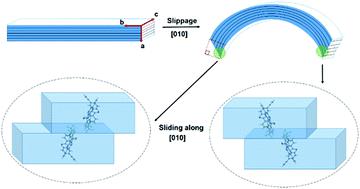当前位置:
X-MOL 学术
›
Chem. Commun.
›
论文详情
Our official English website, www.x-mol.net, welcomes your
feedback! (Note: you will need to create a separate account there.)
The mechanism of bending in a plastically flexible crystal.
Chemical Communications ( IF 4.3 ) Pub Date : 2020-09-17 , DOI: 10.1039/d0cc05904h Subhrajyoti Bhandary 1 , Amy J Thompson 2 , John C McMurtrie 3 , Jack K Clegg 2 , Peuli Ghosh 1 , S R N Kiran Mangalampalli 4 , Satoshi Takamizawa 5 , Deepak Chopra 1
Chemical Communications ( IF 4.3 ) Pub Date : 2020-09-17 , DOI: 10.1039/d0cc05904h Subhrajyoti Bhandary 1 , Amy J Thompson 2 , John C McMurtrie 3 , Jack K Clegg 2 , Peuli Ghosh 1 , S R N Kiran Mangalampalli 4 , Satoshi Takamizawa 5 , Deepak Chopra 1
Affiliation

|
Mechanically adaptable molecular crystals have potential applications in flexible smart materials and devices. Here, we report the mechanism of plastic deformation in single crystals of a small organic molecule (N-(4-ethynylphenyl)-3-fluoro-4-(trifluoromethyl)benzamide) that can be repeatedly irreversibly bent and returned to its original shape without concomitant delamination or loss of integrity. Along with the quantification of the crystals’ local and bulk mechanical properties (hardness, indentation modulus and Young's modulus), micro-focus synchrotron X-ray diffraction mapping show that upon deformation, molecular layers lined with trifluoromethyl groups cooperatively slip past one another resulting in their impressive plastic malleability.
中文翻译:

弯曲可塑性晶体的机制。
具有机械适应性的分子晶体在柔性智能材料和设备中具有潜在的应用。在这里,我们报告了一个小的有机分子(N-(4-乙炔基苯基)-3-氟-4-(三氟甲基)苯甲酰胺)的单晶中的塑性变形机制,该分子可以反复不可逆地弯曲并恢复到其原始形状而不会伴随分层或完整性丧失。随着对晶体的局部和整体机械性能(硬度,压痕模量和杨氏模量)的量化,微焦点同步加速器X射线衍射图显示,在变形时,衬有三氟甲基的分子层会相互滑过,从而导致令人印象深刻的塑性。
更新日期:2020-09-24
中文翻译:

弯曲可塑性晶体的机制。
具有机械适应性的分子晶体在柔性智能材料和设备中具有潜在的应用。在这里,我们报告了一个小的有机分子(N-(4-乙炔基苯基)-3-氟-4-(三氟甲基)苯甲酰胺)的单晶中的塑性变形机制,该分子可以反复不可逆地弯曲并恢复到其原始形状而不会伴随分层或完整性丧失。随着对晶体的局部和整体机械性能(硬度,压痕模量和杨氏模量)的量化,微焦点同步加速器X射线衍射图显示,在变形时,衬有三氟甲基的分子层会相互滑过,从而导致令人印象深刻的塑性。







































 京公网安备 11010802027423号
京公网安备 11010802027423号